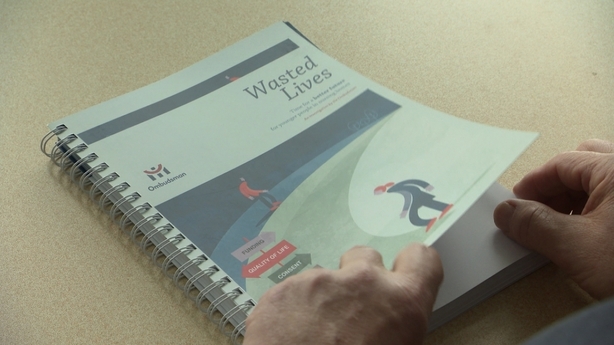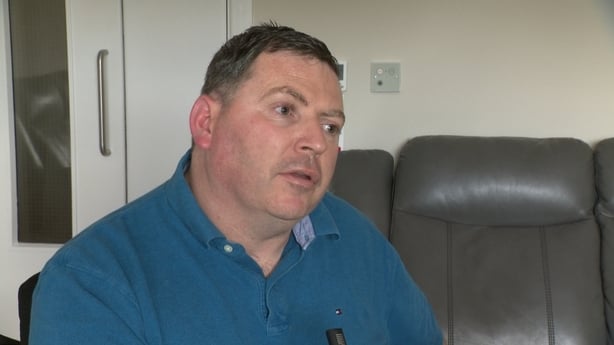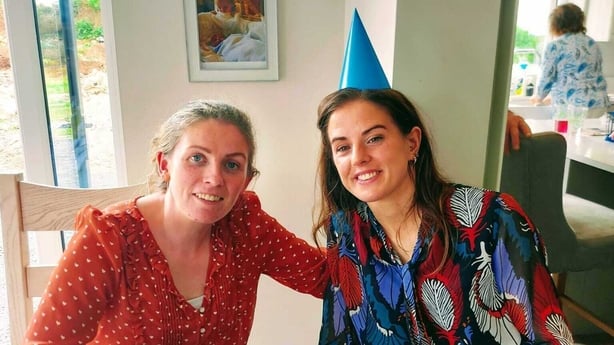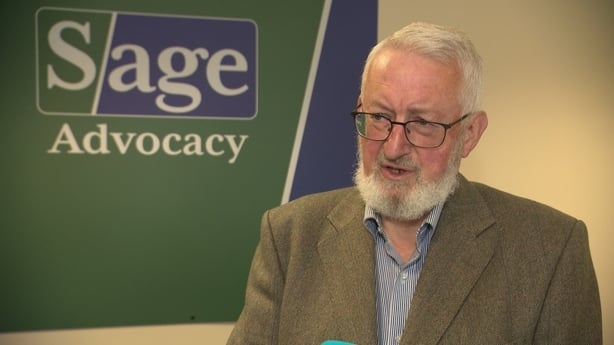Almost 1,300 people aged between 20 and 65 are still being placed in nursing homes because no other adequate services are available, two years after an independent State investigation called for immediate reform of the situation.
New figures, obtained by RTÉ News under the Freedom of Information Act, show that at the start of this year 1,250 people under the age of 65 were in nursing homes in Ireland.
The figure - which includes people with acquired brain injuries, spinal injuries, multiple sclerosis and other conditions - is down only slightly from May 2021, when an ombudsman investigation found just over 1,300 younger people were living in nursing homes.
Two years on, the ombudsman's office has said while some progress has been made, reforms need to be speeded up to address the issue.

According to the latest figures released under FOI, the figure of 1,250 includes 706 men and 544 women.
The vast majority of these are aged between 40 and 65, but at least 50 people aged under 40 are also living in nursing homes
The average stay is 4.5 years, with the longest stay standing at 19.5 years.
According to the data, the youngest person in a nursing home is aged in their 20s.
The figures also show the issue is affecting all parts of the country, within all nine of the HSE's Community Healthcare Organisation areas.
There are 85 affected people in CHO1 (Donegal, Sligo, Leitrim, Cavan, Monaghan), 117 in CHO2 (Galway, Mayo, Roscommon), 100 in CHO3 (Clare, Limerick, Tipperary North), 175 in CHO4 (Cork North Lee, Cork South Lee, Kerry, North Cork, West Cork), 125 in CHO5 (Carlow, Kilkenny, Tipperary South, Waterford, Wexford) and 94 in CHO6 (Dublin South East, Dún Laoghaire, Wicklow).
In CHO7 which takes in Dublin city, Dublin South West, Dublin West, Kildare, and West Wicklow, there are 208 people affected. There were 169 in CHO8 (Laois, Offaly, Longford, Westmeath, Louth, Meath) and 177 in CHO9 (Northern area, Dublin North Central, Dublin North West).
In a statement accompanying the figures, the HSE said it accepted that placing younger people in "nursing home settings" is often "inappropriate", adding that it has set up an Integrated Steering Committee to implement the recommendations of the ombudsman's 2021 'Wasted Lives' report.
The HSE said it has made €5.5m available to help move people out of nursing homes this year.
And it added that a sample review of 409 individuals in this situation has found 30% are in nursing homes due to acute hospital recommendations, 22% "due to a lack of suitable alternative placements or home support" and a further 22% because "no primary carer" was available.
Speaking to RTÉ News, a number of people affected by the situation said nursing homes are not an appropriate setting for many younger people regardless of their injuries.
'It wasn't a brain injury unit, it was an old folks home'
One person is Brian Hogan, a 46-year-old Limerick man who spent several months in a nursing home in his early 30s.
During a night out in Nottingham in 2009, the Limerick man was punched by a stranger and hit his head off the ground. He told friends and paramedics he was okay, but subsequently suffered a severe brain bleed and was placed into an induced coma.
After a period in hospital he was transferred to a nursing home, a situation he said was "like getting a second assault".

"From that assault, when I got to hospital eventually I'd suffered a massive brain bleed.
"I was put into an induced coma to help stabilise me and I was moved into a facility which had advertised itself as a brain injury unit.
"It wasn't a brain injury unit, it was an old folks home. I felt lost, it was like getting a second assault."
He and his family eventually obtained a place at a more appropriate Acquired Brain Injuries Ireland facility near Ennis in Co Clare, where he still lives.
He said this type of service is what people should be given.
"Nursing homes, they're the incorrect setting for anyone wanting to rebuild their lives. I like to say I was rescued out of the nursing home by ABII."
"It can break a person because you're suspended between two worlds"
Geraldine Lavelle, a 36-year-old and from Co Sligo, has been living in a nursing home since 2013 when she was paralysed from her chest down after a cycling incident.
She spent 312 days in hospital before being moved to a congregated nursing home setting due to lack of alternatives services in the west and northwest.
She is due to finally move into her own accommodation later this summer, but says younger people should not be placed in nursing homes and congregated settings for lengthy periods of time.
"It was very scary and mentally challenging," she said.

She added: "The staff were lovely, warm and welcoming, and fantastic but my new home was a room with a hospital bed, a sink and an empty wardrobe. It's the simple things, you take them for granted.
"It was really unhealthy for a young person. It is mentally a lot to deal with because of this limbo.
"It can break a person because you're suspended between two worlds.
"I had hoped I would be living in a community setting within three months, but three months turned into an almost nine-year battle between different agencies and organisations to secure enough of a home care package to live by myself," she said.
Ombudsman Ger Deering said while the HSE is making some progress on the issue, more needs to be done.
He said his office's 'Wasted Lives' investigation in 2021 found more than 1,300 people aged between 20 and 65 were in nursing homes and that his office will be publishing a review of the situation later this year.
"People might be surprised to know that some of the people who are in nursing homes actually go to work on a daily basis. So it's very evident that they can support themselves, they can manage life in general, but they need a little bit of extra help," Mr Deering said.

Sage Advocacy, a group which campaigns for older people in nursing homes and people in vulnerable healthcare situations, agreed reforms are needed as soon as possible.
While acknowledging the fact the HSE is taking steps to address the issue and that nothing can be done unless funding changes take place, the group's chief executive Mervyn Taylor said younger people in these circumstances should not have to wait for service problems to be resolved.
"We have a campaign postcard and it simply says 'to you it's care, to him it's custody'.
"And that's what it feels like to young people [placed in nursing homes].
"Somebody in their 30s after a road traffic accident, somebody in their 40s with multiple sclerosis, and they're in a nursing home with people in their 70s or 80s, a majority of whom might have dementia.
"That really raises profound questions. We know the numbers, we can almost predict them, the problem is the funding," he said.






